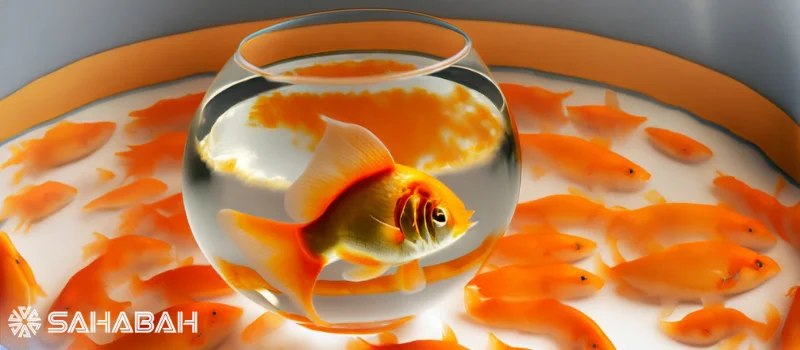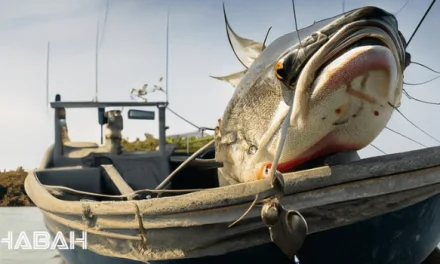As a Muslim consumer, I have often found myself questioning the halal status of certain foods, particularly when it comes to seafood. In this article, I aim to shed light on the halal status of goldfish, debunking common myths and providing factual information to help fellow Muslims make informed dietary choices.
Can Muslims Eat Goldfish According to Islamic Law
Islam provides extensive guidelines on permitted and prohibited foods. One important concept is halal, meaning lawful or permitted. The opposite of halal is haram, meaning prohibited.
Some key principles that determine if a food is halal include:
-
The source of the food must be permissible
-
Certain foods like pork and alcohol are explicitly prohibited in the Quran
-
Food must be slaughtered and prepared according to Islamic method
-
Food should not contain any haram ingredients
The halal status of some foods is not always clear cut. One such food that has sparked debate is goldfish. While kept as pets and ornamental fish by many, some have questioned if goldfish may be consumed by Muslims.
“There is a minority opinion prohibiting the consumption of all ornamental fish, including goldfish.”
This article will analyze the key factors that determine if goldfish are halal or haram.
Classification of Goldfish
Goldfish belong to the carp family of fish. They originated in East Asia as a natural form of carp and were selectively bred as pets.
Some key facts about the goldfish species:
- Part of the Cyprinidae family along with other carp fish
- Developed from a grey/silver carp native to China
- Selectively bred for color mutations and body types
- Popular ornamental fish kept in outdoor ponds and aquariums
“Goldfish are a domestically bred variety of carp known as Carassius auratus auratus.”
Goldfish have been bred into many varieties displaying different colors and body shapes:
- Common goldfish – single-tailed, common orange/gold color
- Comet – long double tail, reddish-orange
- Fantail – dual-lobed tail fin, various colors
- Ryukin – short rounded body, red/white/black combinations
So while they have been bred to have different appearances, goldfish all belong to the same carp species that originated in Asia.
Islamic Rulings on Fish
Fish and seafood have a general permissibility in Islamic law. Several verses in the Quran and sayings of the Prophet Muhammad (pbuh) indicate that fish is permissible for Muslims to eat:
“Lawful to you is game from the sea and its food as provision for you and the travelers” (Quran 5:96)
The Prophet Muhammad (peace be upon him) said: “We have been allowed two dead creatures and two bloods. As for the two dead creatures, they are fish and locust. As for the two bloods, they are liver and spleen.” (Sunan Ibn Majah)
However, there are some conditions around the consumption of fish in Islam:
- Fish must be caught alive from the water or slaughtered properly
- Any poisonous or hazardous fish are prohibited
- Fish should not be cooked in impure oils or dishes
Sources indicate goldfish would fall under the general permissibility of fish based on these principles. However, there is some debate around ornamental fish:
“There is a minority opinion that it is not permitted to eat decorative fish, including goldfish.”
The reasoning and evidence behind this ruling will be analyzed in the next section.
Scholarly Opinions on Goldfish
The majority of Islamic scholars and halal certification organizations consider goldfish to be halal. This view is based on the general permissibility of fish consumption in Islam as long as they are caught alive from the water or properly slaughtered.
Some evidence that goldfish are viewed as halal:
“Goldfish are halal according to the Hanafi School of Islamic law.”
“We hold the view that all non-poisonous fish are halal, including goldfish.”
However, a minority of scholars prohibit the consumption of goldfish and other ornamental fish:
“There is a minority opinion that it is not permitted to eat decorative fish, including goldfish.”
Their reasoning stems from the purpose behind breeding goldfish – which is to keep them as pets rather than as a food source. But the majority still view goldfish as halal given their relation to carp and lack of any explicitly prohibited characteristics.
Comparison Of Goldfish Halal Status to Other Fish
When analyzing the halal status of goldfish, it can be helpful to compare them to other types of fish that have more established rulings.
Similarities to Halal Fish:
- Related to carp, which are permitted
- No poisonous characteristics
- Taken alive from water if used for food
- Not explicitly prohibited in Quran or Hadith
Goldfish share many traits with common halal fish like tilapia, salmon, trout, etc. They come from an permissible family of fish and have no innate hazards that would render them haram.
Differences from Haram Seafood:
- Not a predator like shark
- Do not cause harm if consumed
- No tentacles or shells like octopus/lobster
In contrast, fish that are carnivorous predators or can be dangerous if eaten have been prohibited by most scholars. Goldfish do not fall into the same categories as haram sea creatures.
Based on these comparisons, goldfish tend to have more in common with established halal fish than haram seafood.
Practical Considerations
While the majority of scholars have permitted the consumption of goldfish, there are some additional practical considerations:
- Goldfish are rarely farmed or captured for food purposes currently. They are overwhelmingly kept as pets.
“Goldfish are not mentioned in the list of fish that are widely caught and sold commercially.”
-
If preparing goldfish for food, the relevant rules for slaughter and preparation of fish in Islam should be followed:
- Recite tasmiya/basmala before slaughter
- Use a sharp knife for a single slit to sever veins
- Allow blood to drain from the fish
- Cook thoroughly and avoid cross-contamination
So while they may be halal in principle, goldfish are an uncommon food source compared to fish like tilapia or cod. Muslims who do wish to eat goldfish should take care to handle them according to Islamic regulations.
Is Goldfish Halal – FAQ
Goldfish, as a type of fish, is generally considered halal for Muslims to consume according to Islamic dietary laws. Fish, in general, is categorized as a halal food item.
Are Goldfish crackers halal?
Goldfish crackers, such as the ones produced by Pepperidge Farm, do not contain any animal rennet or enzymes. They are made from vegetarian ingredients and are not made with any meat products, making them suitable for consumption by Muslims.
Can Muslims eat goldfish crackers?
Yes, Muslims can consume goldfish crackers as they are made from halal ingredients. Muslims are advised to check the ingredient list to ensure that there are no haram ingredients included.
Is goldfish a type of fish?
Yes, goldfish is a type of freshwater fish commonly kept in aquariums. It is not classified as a meat product and is considered permissible for consumption by Muslims.
Can Muslims eat cheese goldfish?
Cheese goldfish, which are goldfish-shaped crackers made with cheese, are generally permissible for Muslims to eat. As long as the cheese used in the product is halal-certified and does not contain any haram ingredients, it can be consumed by Muslims.
Do goldfish crackers contain animal rennet or enzymes?
No, goldfish crackers do not contain any animal rennet or enzymes. They are made with vegetarian ingredients and are suitable for consumption by vegetarians and Muslims.
Is it necessary to consult a scholar regarding goldfish halal status?
While it is not strictly necessary to consult a scholar for the halal status of goldfish, if you have specific concerns or doubts, it is recommended to consult a knowledgeable imam or scholar who can provide guidance based on Islamic dietary laws.
Are there different opinions regarding goldfish being halal?
There are typically two opinions among scholars regarding the halal status of goldfish. The majority view considers goldfish and other types of fish as halal, while a minority view considers them impure and not permissible to consume.
Conclusion
Based on an analysis of Islamic dietary laws and scholarly opinions, the majority view appears to be that consuming goldfish is permitted (halal) for Muslims. This view is based on:
- The general allowance of fish consumption in the Quran and Hadiths
- Goldfish’s classification as a type of carp fish, which are halal
- Lack of any explicit prohibition or hazardous traits
However, there are some dissenting opinions prohibiting ornamental fish:
“There is a minority opinion that it is not permitted to eat decorative fish, including goldfish.”
In practice, goldfish are rarely used for food, but Muslims who do wish to eat them should take care to slaughter and prepare them properly.
As with any Islamic dietary law, it is best for observant Muslims to consult their religious scholars and come to an informed decision based on their specific madhhab (school of jurisprudence).





